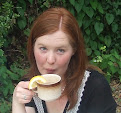I think I've had blogging exhaustion after my almost-daily efforts while on holiday. But records don't write themselves, so I'd better make a note of the two books I finished while I was away. One of which took me about four months to read.
The Golden Notebook by Doris Lessing is giant; the print is tiny, the pages are thin, and it is generally just a tome of a book. The book begins as a novel told in the third person but is interspersed with sections from four notebooks in which the main character, Anna, is recording her life in the first person. These different coloured notebooks record her political life, developments in her writing life, her personal life (dreams, affairs, troubles), and a novel she is writing which is very similar to her real life. To begin with, I loved it; and actually I mostly enjoyed it until towards the end, even though it got a bit confusing - switching from 'Free Women' the novel, to bits of notebooks, to Anna's novel-in-progress which was very similar to her life in the novel 'proper'. I was waiting for the golden notebook to finally tie everything together nicely, but ultimately it didn't do that and after investing so much time in the book it seemed like a bit of a let-down. Especially after perservering through the last few sections of the book in which Anna descends into madness - it became irritating because she kept saying, 'X happened and I could tell I had fallen even deeper into madness than I had ever been before.' The first few times it was fine because, of course, how would you know if things could get worse or not, but after a while it got a bit repetitive.
Lessing has said she wanted to capture a time in history and I do think she achieved that; it was interesting to read about the British Communist Party in the 1950s, the living circumstances of various people in society, and attitudes towards women living alone. Since its publication in 1962, The Golden Notebook has been hailed and condemned as a feminist work but Lessing has said herself that she never intended to write a feminist novel. She was more interested in breakdowns, the fragmentation of personalities, the effect of the world at the time on various individuals, and I think this is pretty clear in the last third of the novel.
I'm glad I finished the book - being set so firmly in London, perhaps it was appropriate that I did so on a plane leaving London - it felt like quite an achievement. I'd be interested to read another of Lessing's novels, but I think I'll wait a wee bit first.
The next book I read was completely different and perfect for reading on a plane. Tina Fey's Bossypants was pretty light reading but very funny (my lack of sleep may have made it even funnier) and seeing as I love reading about people's lives, it satisfied my nosey-side. For a memoir, Tina Fey doesn't actually give much away and that's one of things a lot of the reviews of the book comment on. But it was the same when I read Joy Cowley's memoir, you just have to accept that the writer is only going to tell you as much as s/he wants to and you just have to take what you get and enjoy it. Especially with a memoir, rather than an autobiography.
I really liked the small insight the book gave into being a female in comedy, espeically improvisation, because it's still true that the majority of roles women end up playing in improv are the wife/girlfriend, secretary, mother...When I did Politics: The Musical with The Improvisors a while ago, I came on a few scenes in and announced I was the co-leader of the Green Party because up until that point I had been an MP's wife and a private secretary and I was like, 'Hold on, I'm not having that.' Fey also makes the point that people ask her all the time what it's like being a woman in charge of a sucessful US sitcom, i.e. being female and being the boss, but no one asks Donald Trump whether he finds it hard being a man and being the boss. Fey might give very little away, but she does make some important points.
Subscribe to:
Post Comments (Atom)




No comments:
Post a Comment